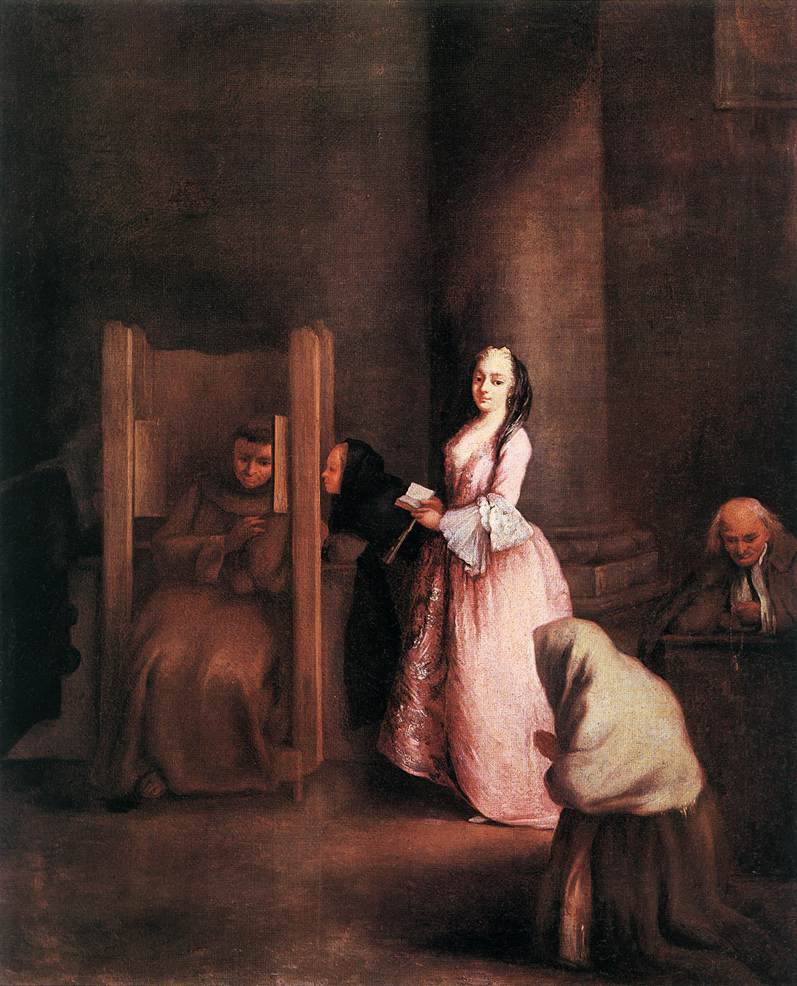
As we sat in the confession queue one Saturday afternoon at the Cathedral, my (newly-minted Catholic) boyfriend remarked to a friend: “I’ve never seen a church with a section where everyone’s sitting together and we all know we’ve screwed up in one way or another.”
Indeed, the sacrament of Confession is an incredible gift. As Catholics, we understand conversion to be the work of a lifetime, not just a one-off event. We are not in Heaven yet, and we are not perfect. Just as we make mistakes and hurt one another in our human relationships, so do we make mistakes and wound the Body of Christ when we sin. Baptism brings us into communion with God, but we still have to grapple with the consequences of the Fall: “a darkened intellect, a weakened will, and an inclination towards evil” (concupiscence). The spirit indeed is willing, but the flesh weak. (Matthew 26:41)
As a human body requires medicine to facilitate its recovery from disease, so does the Body of Christ require reparation to cleanse and reunite its sinful earthly members. Confession is an injection of sacramental grace, a booster shot to strengthen us and repair the bonds we break when we act selfishly, sinning against Love.
If you stand in need of the Divine Physician, do not delay – He is waiting to revive your soul today!
Jesus hearing this, saith to them: They that are well have no need of a physician, but they that are sick. For I came not to call the just, but sinners.
– Mark 2:17We are all earthen vessels – imperfect, shaped too much by the world around us, easily cracked, not very beautiful – but nonetheless holding a heavenly treasure. That treasure is God’s love.
As earthen vessels tended by God’s loving hands, our cracks are healed through the Sacraments of Confession, Eucharist, and the Anointing of the Sick. Eventually, we will become golden chalices, perfected by the refining fires of Purgatory where demons and temptations can no longer interfere with our purification.
– Good News Reflections






4 thoughts on “Confession: Growing in Relationship with God”
Pingback: TVESDAY CATHOLICA EXTRA | Big Pulpit
Pingback: TVESDAY CATHOLICA EXTRA | Big Pulpit
Seems like the sacrament of Reconciliation usually ends up being a relationship with the confessor than with God.
Not really — usually, priests take turns hearing confessions, at least in the churches I frequent, so you don’t keep seeing the same person all the time… but even so, good practical guidance from a confessor on how to stop sinning is not exclusive of a better relationship with God, just as a healthy relationship with your own parents does not detract from a deep relationship with God, or a good relationship with one’s siblings detract from relations with one’s parents. On the contrary, God works through human relationships to draw us all closer to Him in a communal bond of love. In the Sacrament of Reconciliation, we are reunited not only with God but with the Church. The priest simply absolves (unbinds) us, and the forgiveness is from God alone. God knows we are but frail humans, and He is pure Spirit; is it not a gift that He has appointed human ministers of His grace whom we may physically approach and whose counsel we may take, conscious that they be but frail humans too?
As Christ said to the Apostles, “Whose sins you shall forgive, they are forgiven them; and whose sins you shall retain, they are retained.” [John 20:23]
‘Somewhere in the world today then, the successors of the Apostles have the power to forgive. It is not for us to ask: But how can man forgive sins? – for man cannot forgive sins. But God can forgive sins through man, for is not that the way God forgave His executioners on the cross, namely through the instrumentality of His human nature?
Why then is it not reasonable to expect Him still to forgive sins through other human natures to whom He gave that power? And where find those human natures?
You know the story of the box which was long ignored and even ridiculed as worthless; and one day it was opened and found to contain the great heart of a giant. In every Catholic Church that box exists. We call it the confessional box. It is ignored and ridiculed by many, but in it is to be found the Sacred Heart of the forgiving Christ
forgiving sinners through the uplifted hand of His priest as He once forgave through His own uplifted hands on the Cross. There is only one forgiveness – the Forgiveness of God. There is only one “Forgive” – the “Forgive” of an eternal Divine Act in which we come in contact at various moments of time.
As the air is always filled with symphony and speech, but we do not hear it unless we tune it in on our radios, so neither do souls feel the joy of that eternal and divine “Forgive” unless they are attuned to it in time; and the confessional box is the place where we tune in to that cry from the Cross.’
— Archbishop Fulton J. Sheen, “Calvary and the Mass”
http://www.ewtn.com/library/SPIRIT/CALMASS.TXT